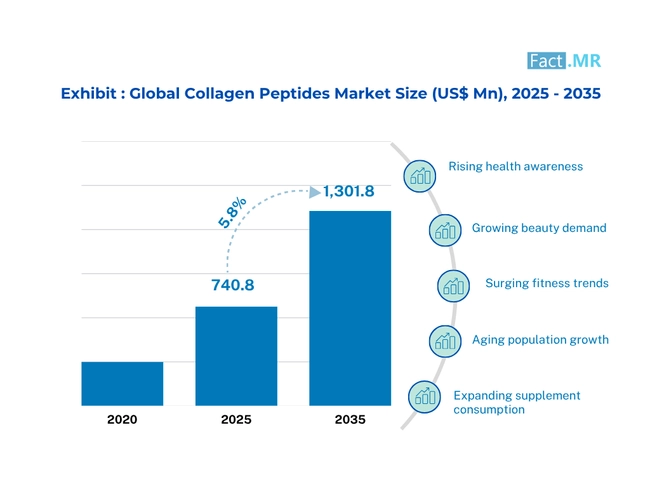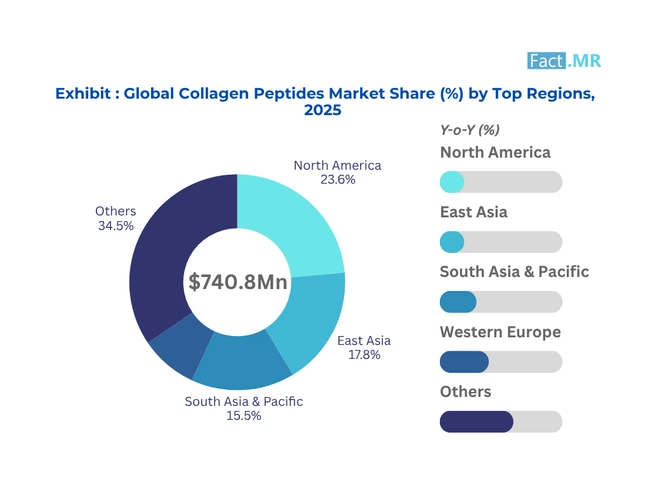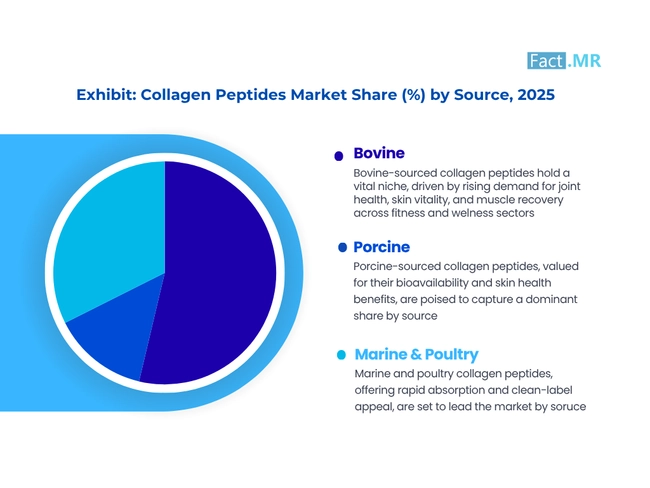Collagen Peptides Market
Collagen Peptides Market Analysis, By Source (Bovine, Porcine, and Marine & Poultry), By Form, By Application, By End User, By Distribution Channel, and Region - Market Insights 2025 to 2035
Analysis of Collagen Peptides Market Covering 30+ Countries Including Analysis of US, Canada, UK, Germany, France, Nordics, GCC countries, Japan, Korea and many more
Collagen Peptides Market Outlook from 2025 to 2035
The global collagen peptides market is expected to reach USD 1,301.8 million by 2035, up from USD 702.3 million in 2024. During the forecast period 2025 to 2035, the industry is projected to expand at a CAGR of 5.8%, due to rising consumer demand for health-focused nutrition, beauty-from-within supplements, and joint health support.
With proven benefits in skin elasticity, bone strength, and muscle recovery, collagen peptides are increasingly featured in functional foods, beverages, and nutraceuticals. Clean-label trends, aging populations, and the growing adoption of clean-label products in sports and cosmeceutical applications globally further reinforce the market’s relevance.

What are the drivers of the Collagen Peptides Market?
The collagen peptides market is gaining significant traction, as it becomes a core component of integrated wellness solutions. With the rise in individualized nutrition, collagen peptides are being used in targeted formulations to address highly specific conditions, such as menopausal bone loss, postoperative care, and optimal digestive system health. Such highly specific applications are taking collagen peptides from general wellness into evidence-backed clinical nutrition.
The convergence of dermal science and nutrition also drives consumer demand. Beauty from within, once a niche, is now a mass-market trend with global beauty players launching nutricosmetic ranges that contain collagen to enhance skin elasticity and delay the formation of wrinkles. This has given rise to a new value proposition, where the consumer views collagen not only as a supplement but also as an active beauty booster, leading to repeat purchases.
In the pharmaceutical sector, advancements in membrane filtration and enzymatic hydrolysis are yielding peptide profiles of superior quality and enhanced bioactivity. These technologies enable stronger efficacy claims and have paved the way for multi-source blends, such as fish and bovine collagen blended for synergistic health benefits.
The emergence of direct-to-consumer models, particularly in the digital health sector, is giving newer firms access to data-driven promotion, facilitating rapid product iteration and customer education. This model is successfully driving awareness and conversion in both mature and emerging markets.
What are the regional trends of the Collagen Peptides Market?

Differentiated demand patterns and supply trends are driving regional growth within the collagen peptides market. Within North America, lifestyle and clinical use are converging, with collagen supplements being increasingly prescribed by health professionals for support of the musculoskeletal system. The United States has witnessed a notable boom in specialized products, such as collagen for menopause therapy and gut recovery, catering to a diverse consumer base.
Regulation and the ecological lines are increasingly segmenting Europe. The preference for marine-sourced collagen is increasing, particularly in the Nordic nations, where traceability and sustainability are key factors influencing purchasing decisions. Germany and France are driving premiumization, favoring products backed by pharmaceutical-level research and certifications. The regulatory landscape, particularly the EU’s evolving stance on novel food ingredients, is fostering an environment that encourages innovation and transparency.
Asia-Pacific is a production and innovation hub. Japan and South Korea are leading product innovation with beauty-food convergence, fusing collagen into daily snacks and drinks. Chinese demand is gathering pace across online wellness platforms, with localized branding initiatives supporting historical perspectives on skin and bone well-being. India's growth trajectory diverges as the demand for halal and vegetarian-compatible collagen products increases, catering to cultural and religious preferences.
Emerging markets, such as Brazil and the UAE, are showing increased adoption through premium retail and e-commerce channels, often tied to beauty and wellness tourism, as well as aspirational health lifestyles.
What are the challenges and restraining factors of the Collagen Peptides Market?
One important hurdle for the collagen peptides market is scientific uncertainty regarding the efficacy of dosing among different population groups. While overall health benefits from collagen are well-established, optimal rates of intake outcomes, including joint healing and dermal regeneration, are still contested. This uncertainty restricts practitioner confidence and precludes incorporation within current clinical practice guidelines.
Discrepancies in labeling and the absence of a global regulatory standard for product classification further complicate the matter. Collagen supplements are often labeled with different types of classifications ranging from diet supplements to functional food, depending on the region. This disparity creates hurdles in cross-border product registration and delays time-to-market for new entrants seeking international expansion.
Consumer skepticism is another essential barrier. As market saturation rises, so does the prevalence of exaggerated claims and unsupported endorsements, which can erode consumer trust. The increased availability of fake or diluted versions of products on online platforms has led to heightened vigilance among savvy consumers, thereby placing greater importance on brand credibility and third-party testing.
Intellectual property problems are emerging as manufacturers create proprietary peptide products. Patent disputes and copying risks increase, especially in low IP enforcement markets. Finally, the limited institutional penetration of the healthcare channel for collagen peptides demonstrates a disconnect between clinical data and prescriber acceptance, suggesting a need for greater scientific outreach and education initiatives.
Country-Wise Insights
| Countries | CAGR (2025 to 2035) |
|---|---|
| United States | 4.7% |
| Germany | 7.1% |
| China | 6.2% |
Functional Nutrition and Digital Retail Shape USA Market Dynamics
The collagen peptides market in the United States is benefiting from sustained interest in functional nutrition, particularly among active and aging populations. Consumer uptake is propelled by increasing awareness of collagen's function in musculoskeletal, skin hydration, and post-exercise recovery. Products are being more extensively included in high-protein meal replacement, beverage-based supplements, and powdered formulations optimized for convenience and efficacy.
E-commerce platforms and wellness subscription formats are expanding access, supported by data-driven personalization platforms pairing consumer needs with targeted formulations. Regulatory clarity from the FDA regarding dietary supplements, combined with a strong clean-label trend, has created a favorable operating environment for product development.
Clinical trials and the market launch of bioactive peptides with outstanding bioavailability also support demand. Cooperative approaches between collagen producers and healthcare firms are beneficial to the industry, as they gain greater prominence for the ingredient in prevention and treatment well-being interventions.
Evidence-Based Formulations and Sustainable Sourcing Drive Growth in Germany
The German collagen peptides market is characterized by its clinical efficacy, product traceability, and eco-friendly production methods. Local consumers demonstrate strong preferences for scientifically validated ingredients, particularly those derived from marine or pasture-raised sources. German manufacturers respond with rigorous quality assurance processes and formulations enriched with micronutrients that support bone and joint health.
Pharmacies and specialist health outlets dominate retail distribution, where trust in product integrity is paramount. Alignment with EFSA regulatory levels ensures high product safety and compliance, which forms the basis for consumer confidence. Sustainability is a significant purchasing driver, driven by growing consumer demand for biodegradable packaging and sustainable ingredients.
Interest in the use of collagen for age-related wellbeing support is also strong, e.g., sarcopenia and osteoarthritis treatment. The market shows resilience through established consumer loyalty, strong domestic production capabilities, and a commitment to transparency and eco-conscious innovation in the health and wellness sector.
Urban Health Priorities and Domestic Innovation Accelerate Growth in China
China's collagen peptides industry is expanding rapidly, led by rising health awareness in urban areas and strong state backing of functional food research. They are propelled by applications in beauty, mobility, and general well-being, particularly by middle-aged consumers with higher disposable income and interest in preventive health.
The market is fueled by dynamic domestic innovation, with domestic enterprises launching functional collagen products that appeal to local flavors such as instant beverages, soups, and blended supplements. Most of these use traditional Chinese medicinal herbs, hence further promoting cultural acceptance and perceived efficacy.
Regulatory oversight by the State Administration for Market Regulation (SAMR) has strengthened quality assurance and consumer trust. The creation of digital consumer ecosystems, such as live streaming shopping and connected health apps, has revolutionized product visibility and customer interaction. In a lifestyle agenda for well-being, collagen peptides are becoming a key component of tailored nutrition regimens in China's rapidly evolving health supplement industry.
Category-Wise Analysis
Bovine-Derived Collagen Benefits from Proven Bioactive Peptide Integrity
Bovine collagen remains the leading choice due to its optimal peptide structure and high compatibility with human physiology. With a greater content of amino acids, including glycine and proline, it facilitates the healing of tissues and supports anabolic activity. The portion benefits from well-established processing procedures that ensure peptide stability in different forms of delivery. Manufacturers utilize selective enzymatic hydrolysis in making hydrolyzed bovine collagen with consistent molecular weights for rapid absorption.

Quality certification schemes such as ISO and HACCP further establish its reliability for supplement and cosmetic formulations. Due to growing demand for traceability of origins, manufacturers of bovine collagen are emphasizing closed-loop supply chains and veterinary-grade inputs. With sound clinical evidence base and formula flexibility, this segment remains the foundation of product development for the ingestible and topical collagen portfolio.
Dry Collagen Forms Advance Due to Supply Chain and Formulation Efficiency
Dry-form collagen peptides represent the preferred industrial formula as they are stable, minimally reactive, and low in cross-contamination risk. Powder form is easy to integrate into tablets, sachets, and RTM (Ready-To-Mix) nutrition systems without the requirement of additional preservatives or emulsifiers. From an operational perspective, dry forms mean less weight to transport and require less storage space, resulting in lower operating costs and improved logistics.
Moreover, cold chain independence allows penetration into markets with limited infrastructure. To the formulation side, microencapsulation technologies for dry collagen powders now deliver delayed release, flavor masking, and better solubility. These innovations have made new opportunities into hybrid supplement forms and state-of-the-art nutracosmetic blends possible. The flexibility of the format between old and new delivery systems renders dry collagen a central key to product development pipelines focusing on efficiency and customization.
Nutritional Applications Leverage Collagen for Holistic Functional Integration
In nutrition, collagen peptides are utilized more as multi-functional bioactive ingredients than as mere protein supplementation. Their inborn ability to stimulate matrix regeneration, such as skin, cartilage, and tendons, positions them at the forefront of integrated holistic wellness solutions. The synergy of collagen with micronutrients, adaptogens, and botanicals enables matrixed delivery for applications in aging, immunity, and stress resilience solutions.
Demand is growing in systems biology-led approaches where collagen acts as a stimulus for endogenous repair mechanisms. In addition, peptide-sequencing innovations enable the tailoring of bioactive fractions to provide targeted advantages in areas such as bone metabolism or gut barrier function. Clean-label innovation is central here, with collagen positioned in organic-certified and allergen-free blends. As biomarker-based nutrition and precision wellness gain traction, collagen-enhanced nutritional products move from mass mainstream supplements to specialized health platforms.
Competitive Analysis
Key players in the collagen peptides industry include Amicogen, Inc., BioCell Technology, LLC, Weishardt Holding SA, Vital Proteins LLC, PB Leiner, Juncà Gelatines S.L., Gelita AG, Nitta Gelatin, Inc., Rousselot SAS, and Tessenderlo Group NV.
The collagen peptides market is growing, driven by increasing demand for clean-label nutraceuticals, functional foods, and personal care products. Growing health consciousness about the benefits of collagen for skin, joint, and bone health, along with varied sourcing options (marine, bovine, and porcine), is driving consumer behavior.
Current advancements in enzymatic hydrolysis and optimization of bioavailability are revolutionizing formulations. Companies are prioritizing sustainability by ensuring traceable supply chains and adopting eco-conscious processing methods. The focus is on high-quality, bioactive peptides tailored for health, wellness, and dietary customization.
Recent Development
- In October 2024, Darling Ingredients launched Nextida™ GC, a bioactive collagen peptide clinically shown to reduce post-meal glucose spikes by up to 42%. Developed under the Rousselot brand, this innovation targets metabolic health, offering a natural solution for glycemic control through a 5-10g dose taken before meals.
- In September 2024, Valemis AG introduced CollaSel™ Tripeptide, an advanced collagen tripeptide with a 500-Dalton molecular weight, enabling superior absorption and rapid bioavailability. This innovation supports bone density, joint strength, skin elasticity, and antioxidant protection, positioning it as a breakthrough ingredient for nutritional supplements, cosmetics, and therapeutic applications in preventive health.
Fact.MR has provided detailed information about the price points of key manufacturers in the collagen peptides market, positioned across regions, including sales growth, production capacity, and speculative technological expansion, in the recently published report.
Methodology and Industry Tracking Approach
Fact.MR’s 2025 Global Collagen Peptides Market report is based on a survey of 11,200 stakeholders across 29 countries, with a minimum of 300 respondents per country. Two-thirds were end-users or producers, including supplement brands, food and beverage manufacturers, and nutraceutical companies. The remainder included supply chain experts, regulatory consultants, and R&D professionals.
Data was collected from June 2024 to May 2025 and weighted according to regional market sizes and demographics. The research assessed demand trends, innovation, investment focus, and key market barriers across the value chain.
Over 270 secondary sources, including peer-reviewed journals, patents, clinical studies, and financial filings, were reviewed. Statistical tools, such as regression analysis, were used to validate the insights. Fact.MR has been tracking the collagen market since 2018, making this report a reliable resource for informed strategic decisions.
Segmentation of Collagen Peptides Market
-
By Source :
- Bovine
- Porcine
- Marine & Poultry
-
By Form :
- Dry
- Liquid
- Capsules
- Gummies
-
By Application :
- Nutritional Products
- Food & Beverages
- Personal Care Products
- Pharmaceuticals
- Others
-
By End User :
- Adults
- Geriatric Population
- Pediatric
- Athletes/Fitness Enthusiasts
- Cosmetic Industry Professionals
-
By Distribution Channel :
- Online Retailers
- Supermarkets/Hypermarkets
- Specialty Stores
- Pharmacies & Drug Stores
- Direct Sales
-
By Region :
- North America
- Latin America
- Western Europe
- Eastern Europe
- East Asia
- South Asia & Pacific
- Middle East & Africa
Table of Content
- Executive Summary
- Industry Introduction, including Taxonomy and Market Definition
- Market Trends and Success Factors, including Macro-economic Factors, Market Dynamics, and Recent Industry Developments
- Global Market Demand Analysis 2020 to 2024 and Forecast 2025 to 2035, including Historical Analysis and Future Projections
- Pricing Analysis
- Global Market Analysis 2020 to 2024 and Forecast 2025 to 2035
- Source
- Form
- Application
- End User
- Distribution Channel
- Global Market Analysis 2020 to 2024 and Forecast 2025 to 2035, By Source
- Bovine
- Porcine
- Marine & Poultry
- Global Market Analysis 2020 to 2024 and Forecast 2025 to 2035, By Form
- Dry
- Liquid
- Capsules
- Gummies
- Global Market Analysis 2020 to 2024 and Forecast 2025 to 2035, By Application
- Nutritional Products
- Food & Beverages
- Personal Care Products
- Pharmaceuticals
- Others
- Global Market Analysis 2020 to 2024 and Forecast 2025 to 2035, By End User
- Adults
- Geriatric Population
- Pediatric
- Athletes/Fitness Enthusiasts
- Cosmetic Industry Professionals
- Global Market Analysis 2020 to 2024 and Forecast 2025 to 2035, By Distribution Channel
- Online Retailers
- Supermarkets/Hypermarkets
- Specialty Stores
- Pharmacies & Drug Stores
- Direct Sales
- Global Market Analysis 2020 to 2024 and Forecast 2025 to 2035, By Region
- North America
- Latin America
- Western Europe
- South Asia
- East Asia
- Eastern Europe
- Middle East & Africa
- North America Sales Analysis 2020 to 2024 and Forecast 2025 to 2035, by Key Segments and Countries
- Latin America Sales Analysis 2020 to 2024 and Forecast 2025 to 2035, by Key Segments and Countries
- Western Europe Sales Analysis 2020 to 2024 and Forecast 2025 to 2035, by Key Segments and Countries
- South Asia Sales Analysis 2020 to 2024 and Forecast 2025 to 2035, by Key Segments and Countries
- East Asia Sales Analysis 2020 to 2024 and Forecast 2025 to 2035, by Key Segments and Countries
- Eastern Europe Sales Analysis 2020 to 2024 and Forecast 2025 to 2035, by Key Segments and Countries
- Middle East & Africa Sales Analysis 2020 to 2024 and Forecast 2025 to 2035, by Key Segments and Countries
- Sales Forecast 2025 to 2035 by Source, Form, Application, End User, and Distribution Channel for 30 Countries
- Competition Outlook, including Market Structure Analysis, Company Share Analysis by Key Players, and Competition Dashboard
- Company Profile
- Amicogen, Inc.
- BioCell Technology, LLC
- Weishardt Holding SA
- Vital Proteins LLC
- PB Leiner
- Juncà Gelatines S.L.
- Gelita AG
- Nitta Gelatin, Inc.
- Rousselot SAS
- Tessenderlo Group NV
- FAQs -
What was the Global Collagen Peptides Market Size Reported by Fact.MR for 2025?
The Global Collagen Peptides Market was valued at USD 740.8 million in 2025.
Who are the Major Players Operating in the Collagen Peptides Market?
Prominent players in the market are Amicogen, Inc., BioCell Technology, LLC, Weishardt Holding SA, Vital Proteins LLC, PB Leiner, among others.
What is the Estimated Valuation of the Collagen Peptides Market in 2035?
The market is expected to reach a valuation of USD 1,301.8 million in 2035.
What Value CAGR did the Collagen Peptides Market Exhibit Over the Last Five Years?
The historic growth rate of the collagen peptides market was 5.2% from 2020 to 2024.